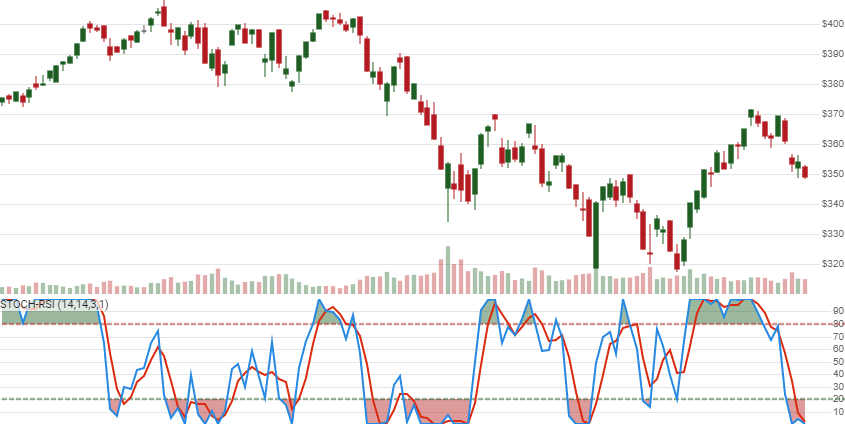Stochastic RSI
get_stoch_rsi(quotes, rsi_periods, stoch_periods, signal_periods, smooth_periods=1)
Parameters
| name | type | notes |
|---|---|---|
quotes | Iterable[Quote] | Iterable of the Quote class or its sub-class. • See here for usage with pandas.DataFrame |
rsi_periods | int | Number of periods (R) in the lookback period. Must be greater than 0. Standard is 14. |
stoch_periods | int | Number of periods (S) in the lookback period. Must be greater than 0. Typically the same value as rsi_periods. |
signal_periods | int | Number of periods (G) in the signal line (SMA of the StochRSI). Must be greater than 0. Typically 3-5. |
smooth_periods | int, default 1 | Smoothing periods (M) for the Stochastic. Must be greater than 0. |
The original Stochastic RSI formula uses a the Fast variant of the Stochastic calculation (smooth_periods=1). For a standard period of 14, the original formula would be indicators.get_stoch_rsi(quotes, 14, 14, 3, 1). The “3” here is just for the Signal (%D), which is not present in the original formula, but useful for additional smoothing and analysis.
Historical quotes requirements
You must have at least N periods of quotes, where N is the greater of R+S+M and R+100 to cover the warmup periods. Since this uses a smoothing technique in the underlying RSI value, we recommend you use at least 10×R periods prior to the intended usage date for better precision.
quotes is an Iterable[Quote] collection of historical price quotes. It should have a consistent frequency (day, hour, minute, etc). See the Guide for more information.
Return
StochRSIResults[StochRSIResult]
- This method returns a time series of all available indicator values for the
quotesprovided. StochRSIResultsis just a list ofStochRSIResult.- It always returns the same number of elements as there are in the historical quotes.
- It does not return a single incremental indicator value.
- The first
R+S+Mperiods will haveNonevalues forstoch_rsisince there’s not enough data to calculate.
⚞ Convergence warning: The first
10×Rperiods will have decreasing magnitude, convergence-related precision errors that can be as high as ~5% deviation in indicator values for earlier periods. We recommend pruning at leastR+S+M+100initial values.
StochRSIResult
| name | type | notes |
|---|---|---|
date | datetime | Date |
stoch_rsi | float, Optional | %K Oscillator = Stochastic RSI = Stoch(S,G,M) of RSI(R) of Close price |
signal | float, Optional | %D Signal Line = Simple moving average of %K based on G periods |
Utilities
See Utilities and Helpers for more information.
Example
from stock_indicators import indicators
# This method is NOT a part of the library.
quotes = get_historical_quotes("SPY")
# calculate StochRSI
results = indicators.get_stoch_rsi(quotes, 14, 14, 1, 1)
About Stochastic RSI
Created by by Tushar Chande and Stanley Kroll, Stochastic RSI is a Stochastic interpretation of the Relative Strength Index. It is different from, and often confused with the more traditional Stochastic Oscillator. [Discuss] 💬
